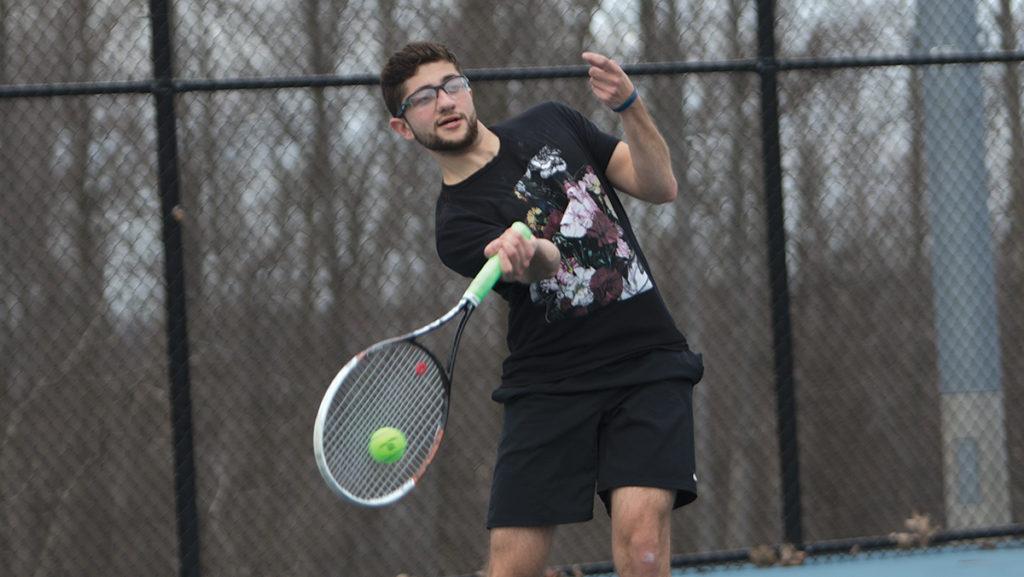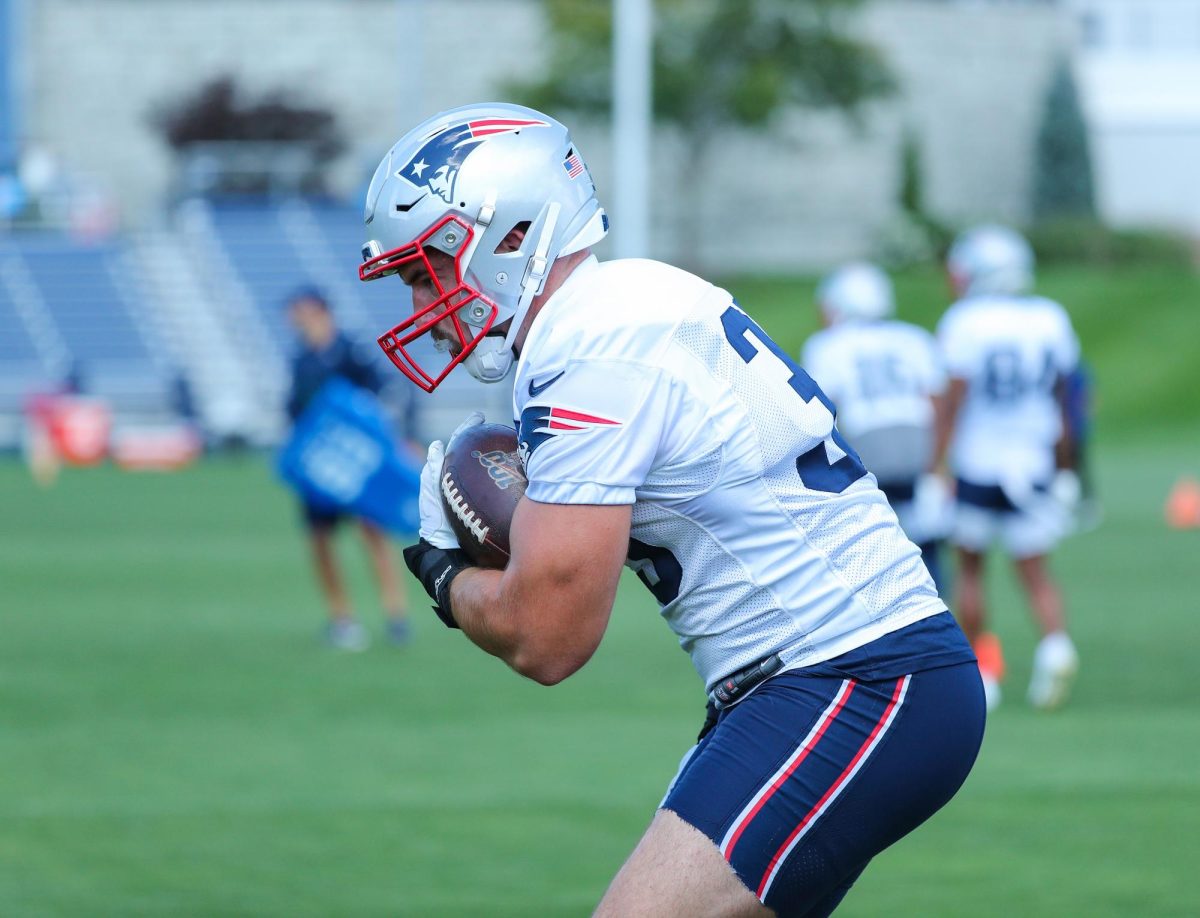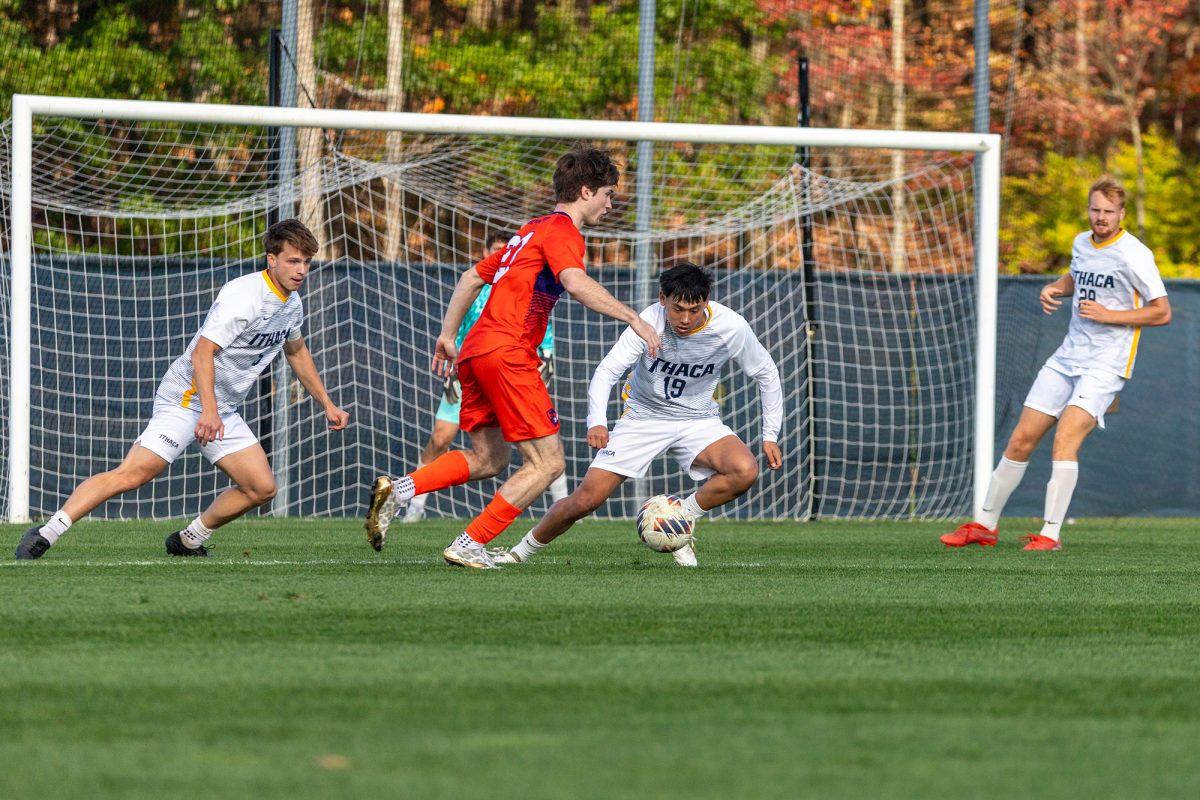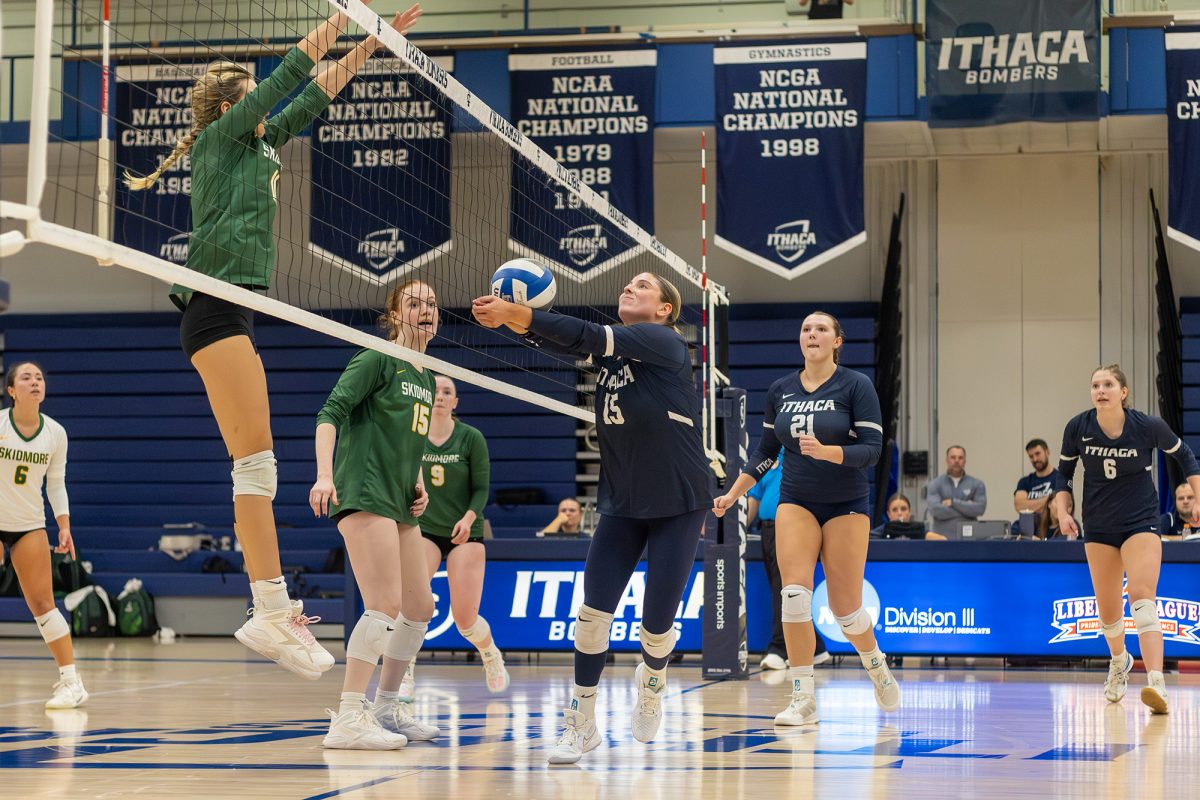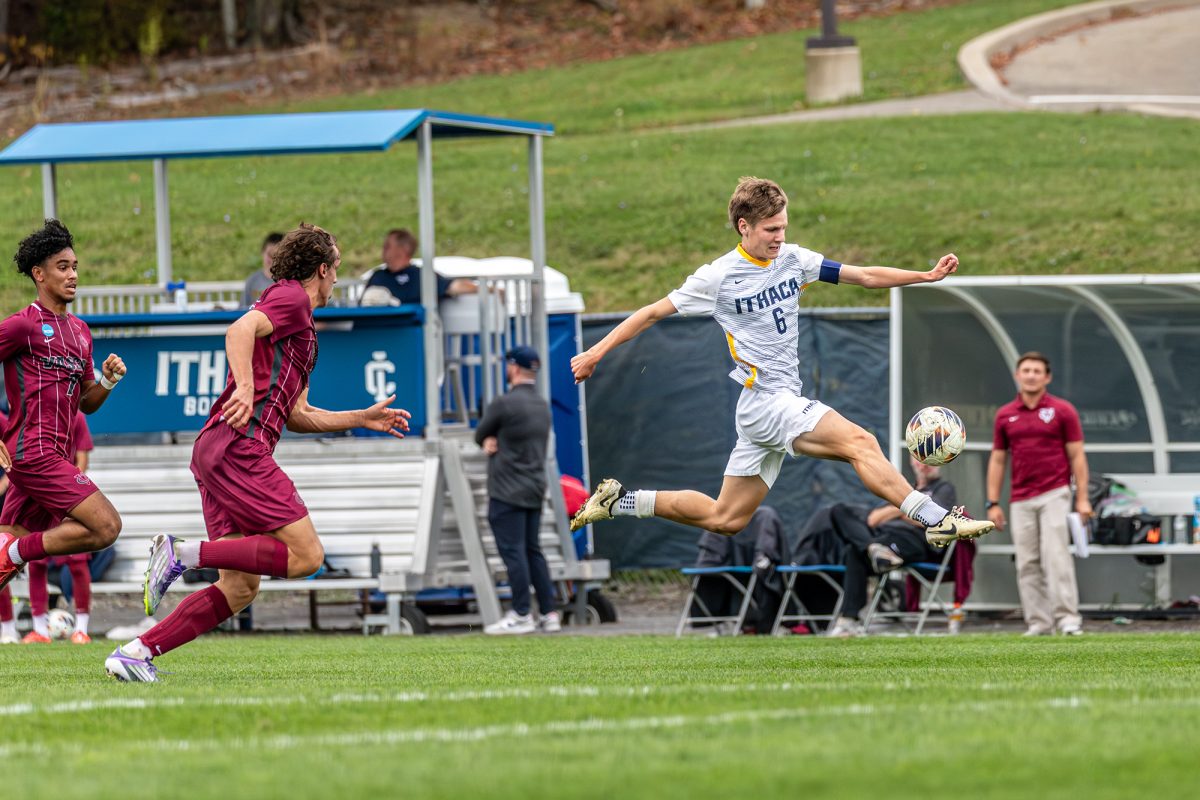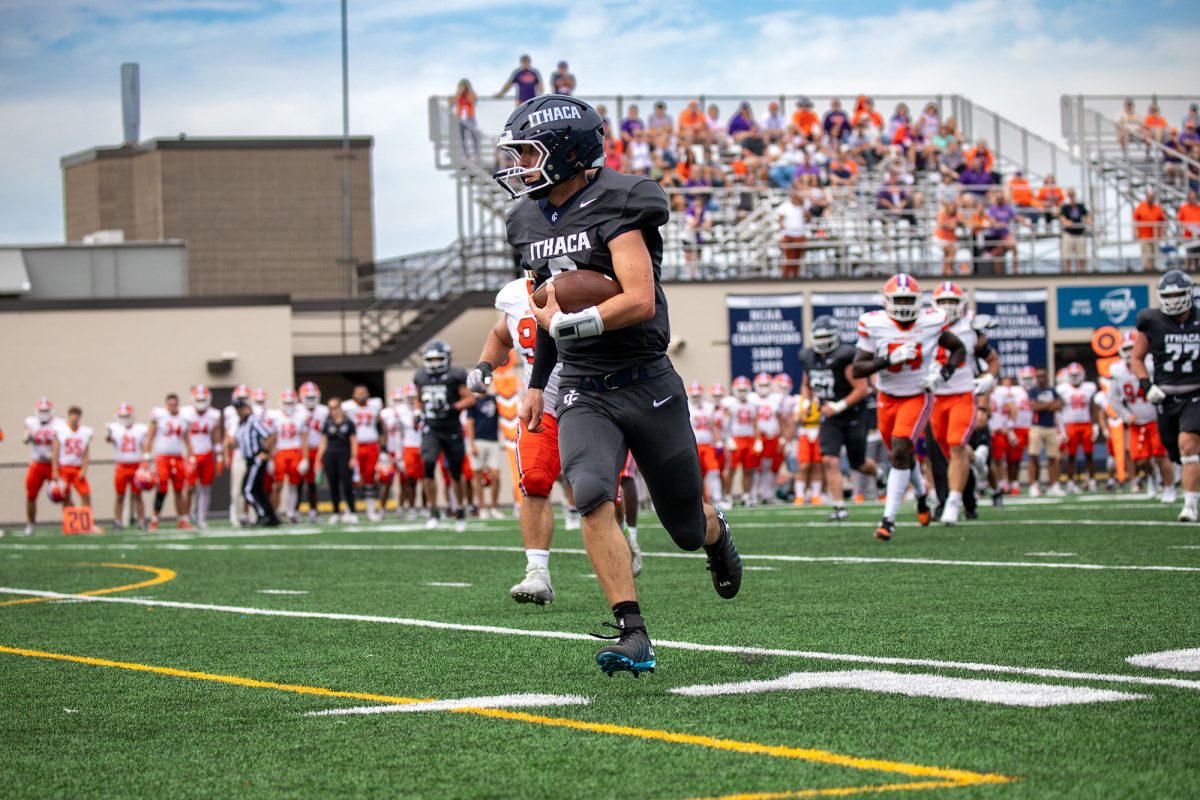During spring break of senior Brandon Buksbaum’s sophomore tennis season, Hilton Head, South Carolina, not only provided a pleasant change of scenery — beaches and warm weather — but it also provided an escape. Most importantly, tennis and the team were diversions.
Just over a month earlier, more than 800 miles north of Hilton Head, Brandon received the news that his father, Larry Buksbaum, had taken his life. The person he had always strived to make proud was gone, and the court quickly became his sanctuary. His grief was far from diminishing by any sense, but it was as if his firm grip on his racket had the intrinsic power to heal.
On the court, Brandon is locked on the ball. Behind the net, planted between the white lines of the court, he is surrounded by a boundary of sorts, where for a moment, tragedy does not enter.
“I just feel like I’m lost,” Brandon said. “I’m zoned in. I don’t really think much of anything else but the point. There’s nothing that really distracts me: the score, my surroundings. I’m really in it, and the whole purpose is just to play my best.”
Oddly enough, in the team’s first game of the spring break trip, the lights on the court turned off around 11 p.m., with Brandon’s first singles match unfinished. The game ended in a tie, as if to suggest wins and losses were not important.
All Brandon needed at the time was to simply play.
“Tennis was my therapy,” he said. “That’s my paradise. The court’s my paradise.”
[acf field=”code1″]
The fragments Brandon remembers of the day — Jan. 31, 2015 — are connected by a series of calls.
The first came from his mother. She told him his father had gone missing that morning and had taken the car but left his cellphone and wallet at home. Brandon assumed he went for a walk, something he often did, but as the day progressed, there was still no word of his father’s whereabouts.
It was not until 8 or 9 p.m. that the second phone call came, this time from campus police. Brandon was studying in the library, but he was told he needed to go to his Terrace dorm to receive a Skype call from his mother. Unsure of what he would be told — maybe his father was found, or maybe he wasn’t, maybe he was injured, he thought — he rode to his dorm in a Public Safety car, frightened and confused.
“I walked up the stairs with the police officer, and he looked really down, and I could tell something just wasn’t right,” he said. “I just didn’t know.”
Upon arriving at his room, his mother and brother were on the other end of the Skype call. They told Brandon there had been an accident but did not specifically tell him it was a suicide — though from what they had told him, Brandon said, he could infer that was the case.
“This was an excruciating situation,” Karen Buksbaum said. “Knowing that the words about to be spoken will immeasurably hurt your child is heartbreaking.”
While Brandon was shocked, he said he knew just how horrified his mother and brother were on the other side of the screen. More than 200 miles away from his family and separated by a mere computer screen, Brandon refrained from showing any emotion. He needed to be strong for his family.
But with a click of a button, the call ended, and he was left alone in his room.
“When they ended the Skype call and the police officer who was there left, I just collapsed,” Brandon said. “It was the worst moment of my life. I was a complete mess.”
Each day that week was a spiral downward, another day he had to wrestle with the idea that his father was gone. It was not until Brandon came home, Karen said, that she informed him it was a suicide.
“We went up to his room and sat on his bedroom floor, which has always been a comfortable place for us to talk about things,” Karen said. “I told him then that it was not an accident. He kind of knew that.”
Brandon said he knew his father had been struggling for some time. During a nine-month span, his father was plagued by tinnitus — ringing in the ears — that was later accompanied by depression and vertigo. The combination of these illnesses manifested into a destructive cocktail that was getting harder and harder for his father to handle. From having trouble walking to experiencing emotional mood swings to not wanting to eat, Brandon said, it was clear his father was getting weaker, both physically and emotionally.
During this period, whenever Brandon was home, he said, he always tried making sure that his father was OK. His father had always been there for him and his brother, Scott — no matter how long and hectic his days were — whether it was supporting Brandon in tennis or Scott’s playing the bass.
“I would always reference to tennis matches,” he said. “‘Yeah, sure you lost the first set, but you can always come back. There’s always that second set. You can always keep playing.’ And he took it. He knew it. He knew what I was trying to tell him: Keep fighting. And he did. He did keep fighting.”
While away from home, there were also the texts. When Brandon was off at school, he said he remembered receiving text messages from his father telling him how much he loved him. He said he could sense a feeling of hopelessness in his father’s words. While the texts were filled with expressions of love and affection, he also sounded like he had given all he could to Brandon and his brother.
When the Skype call arrived, Brandon was despondent.
“He just couldn’t handle it anymore,” he said. “He must have thought it through a million times, and I guess one day had to think about it and did it.”
Every year, over 40,000 Americans in the United States die by suicide, and for each person lost to suicide, there are an estimated six survivors — family members or friends — whose lives go on, left to grapple with what happened.
“Losing a parent at any age is an extremely difficult experience,” Karen said. “Losing a parent who died by suicide takes it to a different level. It’s not only about grieving the loss, but also understanding the mental or physical illness that consumed the loved one.”
A few days after receiving the news, Brandon’s first response was to go home for the funeral and to support his family, so he drove the more than three hours to his town of Demarest, New Jersey. He delivered a speech at the funeral. He did not crack.
But eventually, he also needed to do something for himself. If Brandon was a rock for his mother and brother, tennis was his boulder.
—
From an early age, Brandon stayed active playing sports like basketball, soccer and baseball. Yet it was not until he was 10 years old that he discovered tennis. His parents introduced him to the sport, and as Brandon continued to play at his local racket club, he gravitated toward the mental challenge it presented.
While Brandon’s father was never an athlete, he was involved in his son’s tennis endeavors nonetheless. Because Larry did not know as much about the physical and technical aspects of the game, he often talked to his son about the mental component and how important practice was.
After all, his father was a guitarist for more than forty years, so he knew what it meant to try to perfect a craft. After attending New York University for music, where he was also in a band, he became a sound engineer in New York City.
“The guitar was his main instrument, and he played that every day for hours on end,” Brandon said. “It was his way of getting out. Just like how tennis is to me, the guitar was to him.”
Larry would often learn more about tennis from watching his son play in tournaments and was intent on doing his own research on the sport as well. Brandon said it meant a great deal to him to see how genuinely involved his father wanted to be in his interests, even when he thought it sometimes was too much.
There was one tennis tournament Brandon particularly remembers, in which he lost badly in the first round. After the match, Brandon said, his father took him outside and lectured him for an hour about what he could improve on and what he may have done wrong. At the time, Brandon said, he remembers being annoyed. All he wanted to do was go home.
“Looking back on it now, he really cared about my game, really cared about what my passions were,” he said. “That just meant a lot.”
—
Brandon needed to return to Ithaca College and his tennis squad. His friends, his routine, his identity are all connected to the team. His coaches and teammates were ready to support him.
Initially, Brandon was split between being at home and being back at school. He wanted to be with his family and make sure everything was OK, but he also needed the familiar soundtrack of his life: the sounds the ball makes as it bounces on the court, hits the racket and whooshes through the air, the shouts of his teammates. For Brandon, the court and his team are where he finds his comfort.
“We’re always together — we’re always close, and they were there for me,” he said. “They knew what I was going through. They took care of me, and that is one of the most meaningful things that I could ever ask for.”
Brandon said that when he arrived back on campus, he could count on his teammates to be there for him. Initially, the squad did not think Brandon was going to practice, let alone play matches, but to its surprise, he did. But head coach Bill Austin said he understood why.
Four years ago, right before the women’s Empire 8 Championships, Austin lost his niece to an accident that had predisposed her to positional asphyxiation. He said he could have decided not to coach but felt he needed to. He needed his team just like Brandon now needed his.
“We were all affected by it,” Austin said. “When somebody is going through something like that, it’s never easy. It’s not routine by any stretch of the imagination. We all have our own little bubble, but that’s life. Things take on a far greater meaning than just wins and losses. It’s real life. That’s the great thing about teams and family and togetherness.”
Former teammate and captain Chris Hayes ’16 spearheaded an idea to get everyone on the squad wristbands in honor of Brandon and his father. The team presented Brandon with the wristbands the first day of the spring break trip, and Brandon had been completely unaware his teammates were doing such a thing for him. Inscribed on the front of the band is “Play for LB” — his father’s initials — while the inside says “Go Bombers.”
“I was completely shocked,” Brandon said. “I was paralyzed. They wanted to give a team hug, and I couldn’t get off the couch because of it.”
While Brandon already knew his teammates were there for him, senior Nate Wolf said presenting the wristbands to him just further showed how much he meant to the team.
“He didn’t really know what to say at the time, but I think it was a really nice gesture, and I think wearing these the whole spring break was a nice unifying symbol for our whole team,” Wolf said. “I haven’t taken mine off, honestly, for the last two years.”
For Brandon, spring break was therapeutic and part of a longer healing process. Austin said tennis and the team were stabilizers for Brandon and produced as much of a feeling of normalcy as he could have had at that time.
“I think that’s what playing and getting back into the routine enabled him to do,” Austin said. “It is an opportunity to keep your mind from wandering. It gives you that opportunity to focus, have a little bit of tunnel vision here and not let things creep in as much. It’s much different than waking up in the middle of the night, and your mind starts to wander, and you start to think.”
Hayes said the way Brandon was able to play even after his father died motivated him to always play his hardest.
“Whenever Brandon took to the court, I felt really inspired to play well for him,” Hayes said. “I know he pushed me to be a better person and a better player because of what had happened, and I think he did the same for a lot of the guys on the team as well.”
—
To symbolize what his father meant to him, Brandon decided to get a tattoo. There’s a comforting permanence that lies in the ink etched on his skin’s canvas.
While Brandon and his father shared different tastes in music — he prefers EDM, while his father was more of the rock, rhythm and blues, and jazz type — they bonded over music nonetheless.
For Brandon, one set of lyrics and the gentle sounds of the guitar that accompany those words transport him back to a time he would hear his father working in the basement of his house.
More often than not, from upstairs, Brandon would be unable to recognize most of the songs his father would be playing. But there was one song in particular that, without fail, he could always distinguish because of its identifiable guitar riff: “Blackbird” by The Beatles. As a tribute to his father, he decided to get the lyrics “Take these broken wings and learn to fly” tattooed on the upper-right side of his back.
“He’s always with me no matter where I go, no matter what I do,” Brandon said. “I feel protected.”
While Brandon said he will always feel the pain of no longer having his father in his life, he said his father will always inspire him and motivate him because of who he was and what he accomplished.
“I want to continue being someone who is like him because I want to be like him,” Brandon said. “He’s my role model. He’s my icon. He’s like my Superman. I look up to him, and I want to keep making him proud.”


